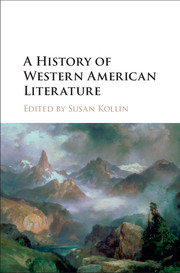Book contents
- Frontmatter
- Contents
- Notes on Contributors
- Acknowledgments
- Introduction: Historicizing the American Literary West
- PART I HOMELANDS
- PART II MAKING A REGION
- 3 Domestic Frontiers: Settler Narratives by European American Women Writers
- 4 Labor and the Land: Narratives of Trading, Mining, and Ranching
- 5 Nature Writing and the American West
- 6 Tall Tales and Short Stories
- 7 The Popular Western
- PART III GEOGRAPHIES OF THE LITERARY WEST
- PART IV THE TWENTIETH CENTURY AND BEYOND: LITERARY MOVEMENTS AND CRITICAL PERSPECTIVES
- Selected Bibliography
- Index
4 - Labor and the Land: Narratives of Trading, Mining, and Ranching
from PART II - MAKING A REGION
Published online by Cambridge University Press: 05 November 2015
- Frontmatter
- Contents
- Notes on Contributors
- Acknowledgments
- Introduction: Historicizing the American Literary West
- PART I HOMELANDS
- PART II MAKING A REGION
- 3 Domestic Frontiers: Settler Narratives by European American Women Writers
- 4 Labor and the Land: Narratives of Trading, Mining, and Ranching
- 5 Nature Writing and the American West
- 6 Tall Tales and Short Stories
- 7 The Popular Western
- PART III GEOGRAPHIES OF THE LITERARY WEST
- PART IV THE TWENTIETH CENTURY AND BEYOND: LITERARY MOVEMENTS AND CRITICAL PERSPECTIVES
- Selected Bibliography
- Index
Summary
In Ranch Life and the Hunting-Trail (1888), Theodore Roosevelt reflected on the West's transitional moment, as the wild past retreated before what he calls “the white advance throughout all our Western land.” He presents three types – the trapper, the miner, and the cowboy – “the forerunners” of civilization's march. To Roosevelt, all three were heroic, alienated from an industrializing world, and doomed. “The trapper and the miner were the pioneers of the mountains, as the hunter and the cowboy have been the pioneers of the plains,” writes Roosevelt; “they are all of the same type, these sinewy men of the border, fearless and self-reliant, who are ever driven restlessly onward through the wilderness by the half-formed desires that make their eyes haggard and eager.” Yet their time is limited as they slip into the remote pockets of both place and memory: “The old race of Rocky Mountain hunters and trappers, of reckless, dauntless Indian fighters, is now fast dying out. Yet here and there these restless wanderers of the untrodden wilderness still linger, in wooded fastnesses so inaccessible that the miners have not yet explored them, in mountain valleys so far off that no ranchman has yet driven his herds thither.” Roosevelt imagines this hunter and trapper not only “dying out” but already buried, deep within the western landscape. The cowboy, too, “brave, hospitable, hardy, and adventurous,” is on his way out: “he prepares the way for the civilization from before whose face he must himself disappear.” It is the cowboy's job to prepare the trail that in turn becomes the landscaped mark of his absence.
Although, as Wallace Stegner reminds us, “the fur trade, the gold rushes, [and] the open range cattle industry … lasted hardly longer than the blink of an eye,” few western legacies are more enduring to the American West's popular and scholarly story than trading, mining, and ranching, and few western types are more enduring than the trapper, the miner, and the cowboy. What connects the three types? What links the narratives of trapping, mining, and ranching? Part of the answer can be found in a set of cultural codes (about masculinity, race, labor, wilderness, and so on) that continue to resonate in the twenty-first century. There is nothing simple or benign about these codes, and breaking them is time-honored work.
- Type
- Chapter
- Information
- A History of Western American Literature , pp. 65 - 81Publisher: Cambridge University PressPrint publication year: 2015

